Ever found yourself intrigued by terms like ISFJ or ENTP, or by personality types? You’re in the right place—let’s uncover the mystery together!(Utilizing the best time tracking software can complement understanding these dynamics.) Welcome to the dynamic intersection of individuality and professional excellence — the exploration of personality types in the workplace. In a world where diversity thrives, understanding the 16 personality types serves as a key tool for navigating team dynamics. Furthermore, it helps improve communication styles, time management skills, time management techniques, and productivity levels. Join us on a journey where personality types aren’t just traits but blueprints for success in the professional realm.
MBTI Personality Types: A Guide to Understanding Your Team
The Myers-Briggs Type Indicator (MBTI) is a psychological tool founded by Katharine Cook Briggs and her daughter Isabel Briggs Myers in the early to mid-20th century. Designed to explore and categorize the diverse spectrum of human personalities, the MBTI has become a cornerstone in understanding individual differences, particularly in the workplace. The MBTI assesses personality types through four dichotomies, each representing a fundamental aspect of human behavior:
- Extraversion (E) vs. Introversion (I): Determines where individuals direct their energy—towards the outer world of people and activities (extraversion) or the inner world of thoughts and reflection (introversion).
- Sensing (S) vs. Intuition (N): Explores how individuals prefer to take in information—through concrete and factual details (sensing) or through interpreting and adding meaning (intuition).
- Thinking (T) vs. Feeling (F): Examines how individuals make decisions—based on logic and consistency (thinking) or on personal values and special circumstances (feeling).
- Judging (J) vs. Perceiving (P): Reflects how individuals prefer to deal with the outer world—by planning and organizing (judging) or by adapting and going with the flow (perceiving).
The combination of these four dichotomies results in 16 unique personality types, each with its distinct set of traits and tendencies. These types offer a comprehensive framework for understanding how individuals approach work, communication, and collaboration within professional settings.
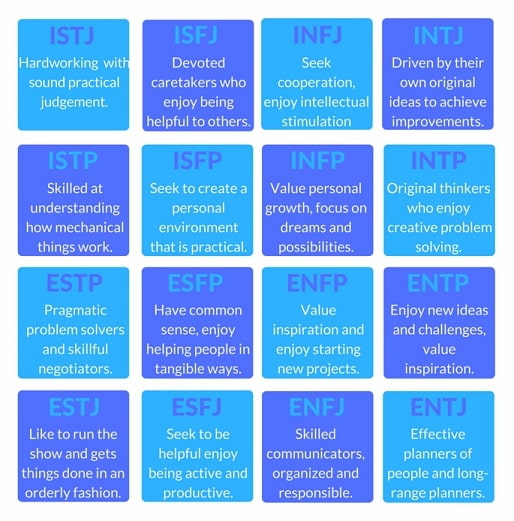
Whether you’re an analytical INTJ craving structured employee time tracking or a creative ENFP seeking flexibility, Everhour has you covered. With its intuitive time tracker, Everhour empowers individuals to align their work habits with their unique personality traits. If you’re struggling with being on time or need to know where your time is spent, you can use its immaculate attendance tracker or work hours tracker. Embrace efficiency and productivity tailored to your style, ensuring that every moment is optimized for success.
Criticisms of MBTI in hiring
While the Myers-Briggs Type Indicator (MBTI) provides valuable insights into personality dynamics, it’s crucial to approach its application in hiring with a discerning eye. Here are three primary reasons why MBTI classifications might not be the go-to factor in professional decision-making:
👩🔬 Lack of scientific validation
Critics argue that the MBTI lacks empirical evidence to support its reliability and validity. The test’s dichotomies often oversimplify the complexity of human personality, and the classifications may not consistently align with an individual’s behavior across various situations. As a result, relying solely on MBTI results for hiring decisions could lead to inaccurate assessments.
🤔 Fixed vs. fluid nature of personality
Opponents contend that personality types are not fixed but evolve and adapt to different contexts. The MBTI’s static classifications may overlook the fluidity of individual traits, making it challenging to capture the dynamic nature of personalities in professional settings. Hiring decisions based solely on MBTI results might disregard the potential for personal and professional growth.
🔮 Limited predictive power
While the MBTI excels in providing insights into preferences and tendencies, it has limited predictive power regarding job performance or success in a particular role. Job-related skills, experience, and other competency assessments often play more significant roles in determining professional success. Relying on MBTI classifications alone may neglect essential factors crucial for job effectiveness.
While there are some drawbacks to using MBTI personality types, looking at them can still be a fun and useful way to understand how people work together. It shouldn’t be the only factor in making hiring decisions, but knowing how different preferences affect communication and teamwork can improve collaboration. Think of MBTI as a tool for building stronger teams and better self-awareness, not the only thing that guides professional choices.
Is there a smartest personality type?
In terms of personality types, the notion of a “smartest” or “most productive” type remains elusive and subjective. The Myers-Briggs Type Indicator (MBTI) does not assign intelligence or productivity rankings to its 16 personality types. Each type possesses unique strengths and potential areas for growth, making it challenging to label one as inherently smarter or more productive than another.
🧠 Diverse intelligence and productivity
Intelligence and productivity are multifaceted qualities influenced by various factors, including education, experience, and personal development. MBTI types showcase diverse approaches to problem-solving, communication, and work styles, reflecting the richness of human cognition and behavior.

💪 Harnessing individual strengths
Rather than seeking a universally “smartest” or “most productive” type, it’s more fruitful to recognize and leverage individual strengths within each personality type. Different situations may call for different skills and perspectives, and a team comprising a variety of types can benefit from this diversity.
🤝 Embracing collaboration
Team success often stems from effective collaboration, where individuals bring their unique talents to the table. By appreciating and understanding the strengths of each personality type, teams can create environments that foster innovation, creativity, and overall productivity.
In essence, the idea of a singularly smart or productive personality type is a misnomer. Embracing the diversity of MBTI types within a team allows for a holistic and dynamic approach to problem-solving and collaboration, ensuring a well-rounded and collectively intelligent workforce.
16 MBTI Types in the Workplace
The MBTI test includes four categories, each featuring four personality types:
| Analysts | Diplomats | Sentinels | Explorers | |
| INTJ (The Architect) INTP (The Thinker) ENTJ (The Commander) ENTP (The Debater) |
INFJ (The Advocate) INFP (The Mediator) ENFJ (The Giver) ENFP (The Champion) |
ISTJ (The Inspector) ISFJ (The Protector) ESTJ (The Director) ESFJ (The Caregiver) |
ISTP (The Crafter) ISFP (The Artist) ESTP (The Persuader) ESFP (The Performer) |
Let’s explore each of them in detail to see what they contribute to the workplace and what they should work on to be more productive.
INTJ (The Architect) in the workplace
INTJs, known as “The Architects” or “Masterminds,” are strategic and visionary individuals who possess a sharp analytical mind. These independent thinkers thrive on solving complex problems and designing systematic approaches to achieve their goals. INTJs are often characterized by their forward-thinking nature, strategic mindset, and ability to see the big picture. Their logical and objective approach to decision-making makes them effective leaders and problem solvers.
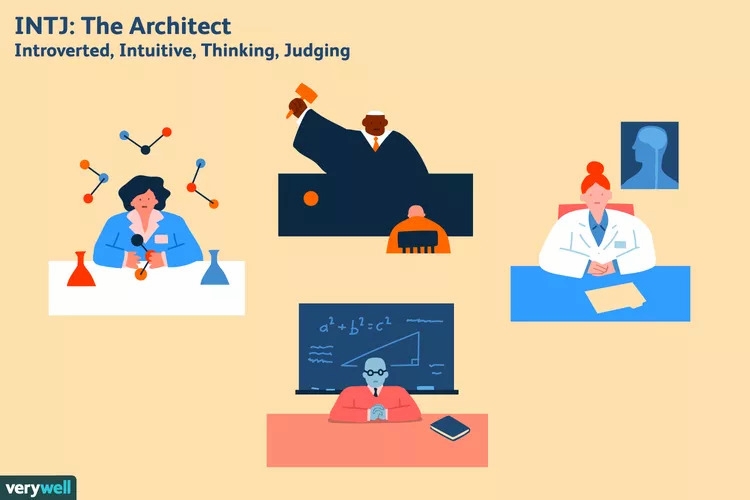
In professional settings, INTJs excel in roles that require long-term planning, strategic thinking, and innovative problem-solving. They are natural visionaries who can anticipate future challenges and devise comprehensive solutions. Known for their preference for autonomy, INTJs value independence in their work and appreciate environments that allow them to implement their ideas without unnecessary constraints.
However, INTJs may face challenges in interpersonal dynamics due to their direct communication style and a tendency to prioritize logic over emotions. Their intense focus on efficiency and results can sometimes be perceived as aloofness or insensitivity. INTJs need to work on balancing their analytical strengths with effective communication and understanding the emotional aspects of team dynamics.
How INTJs can be more productive:
- Strategic planning: INTJs excel in strategic thinking. They can leverage this strength by creating detailed plans and timelines to guide projects efficiently.
- Independence: They recognize and embrace their independence, preferring to work in environments that allow autonomy. This enables them to implement their ideas with minimal constraints.
- Delegation: While independence is key, they should learn to delegate effectively. Acknowledging the strengths of their team members and allocating tasks accordingly helps achieve optimal outcomes.
- Continuous learning: Cultivating a mindset of continuous learning is important for INTJs. Staying updated on industry trends and advancements fuels their innovative thinking.
- Balance: INTJs should find a balance between perfectionism and efficiency. Aiming for excellence without getting bogged down by unnecessary details is crucial to avoid hindering progress.
Pain points of INTJs:
- Overthinking: INTJs’ analytical minds can lead to overthinking. Individuals with this personality type can practice mindfulness and recognize when it’s time to make decisions rather than endlessly analyzing.
- Impatience with inefficiency: The Architects may need more efficient processes. It’s beneficial for them to focus on providing constructive feedback and collaborating on solutions rather than expressing impatience.
- Social challenges: INTJs might find social interactions challenging. Encouraging them to engage in team-building activities and developing interpersonal skills can be helpful.
- Inflexibility: The rigid nature of INTJs can hinder progress when unexpected changes occur. Cultivating a more flexible mindset is essential for adapting to unforeseen circumstances.
INTP (The Thinker) in the workplace
INTPs, often referred to as “The Logicians” or “Thinkers,” are characterized by their analytical and logical thinking. They thrive on exploring theoretical concepts, seeking to understand the underlying principles that govern the world around them. INTPs are known for their deep curiosity, intellectual flexibility, and innovative problem-solving abilities.
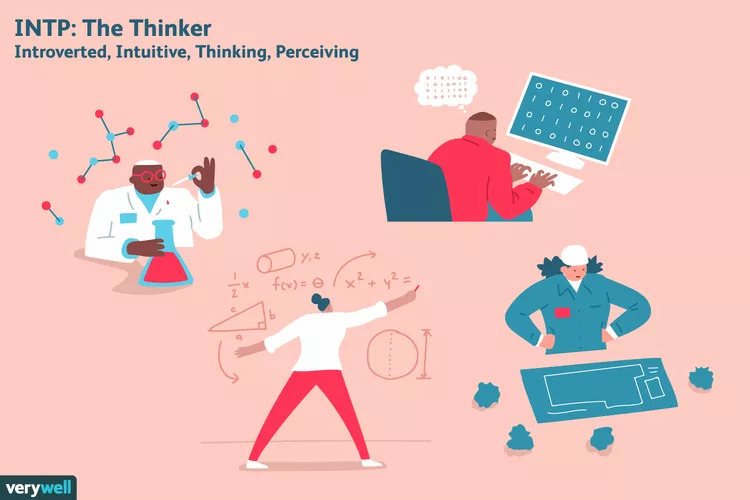
In professional environments, INTPs excel in roles that require creative problem-solving, research, and the application of theoretical knowledge. They are adept at analyzing complex systems, identifying patterns, and proposing innovative solutions. With a natural inclination towards independent work, INTPs value opportunities that allow them to explore their interests and contribute unique insights.
However, INTPs may face challenges in tasks that demand routine or repetitive work, as they prefer roles that allow for continuous learning and exploration. Their focus on logic and rationality can sometimes lead to challenges in interpersonal communication, as they may prioritize objective analysis over emotional considerations. Cultivating effective collaboration and interpersonal skills can enhance their professional interactions.
How INTPs can be more productive:
- Creativity zones: Create dedicated spaces for creative thinking. INTPs thrive in environments that allow them to explore ideas freely without rigid structures.
- Structured planning: Implement structured planning methods. While spontaneity is valuable, having a clear plan can help INTPs stay on track and bring their innovative ideas to fruition.
- Collaborative innovation: Individuals with this personality type can foster collaborative innovation by actively engaging with diverse perspectives. Working with others can enhance the richness of their ideas and contribute to more comprehensive solutions.
- Prioritize tasks: Develop a system to prioritize tasks. INTPs can be drawn to multiple projects simultaneously, so prioritizing ensures focus and efficiency.
- Regular breaks: Acknowledge the need for breaks. The Thinkers may immerse themselves deeply in their work, but periodic breaks can enhance overall productivity and prevent burnout.
Pain points of INTPs:
- Overthinking: Similar to INTPs, individuals with this personality type might face challenges related to overthinking. Striking a balance between thorough analysis and timely decision-making is essential for effective problem-solving.
- Implementation hurdles: INTPs may encounter difficulties in implementing their ideas. Developing strategies to bridge the gap between innovative concepts and practical execution can enhance their ability to bring ideas to fruition.
- Deadline management: Proactively managing deadlines is key. The inclination to explore multiple possibilities can sometimes lead to delayed decision-making, impacting project timelines. Cultivating a sense of urgency and prioritization is beneficial for efficient project completion.
- Communication style: Addressing communication challenges is crucial. INTPs may find it challenging to express complex ideas concisely. Honing communication skills enables them to convey their thoughts effectively and fosters better collaboration.
ENTJ (The Commander) in the workplace
ENTJs, known as “The Commanders” or “Executives,” are characterized by their assertive, strategic, and results-driven approach to life. These individuals thrive on taking charge, leading others, and achieving ambitious goals. ENTJs are natural leaders who excel in envisioning long-term plans, organizing resources effectively, and executing strategies with precision.
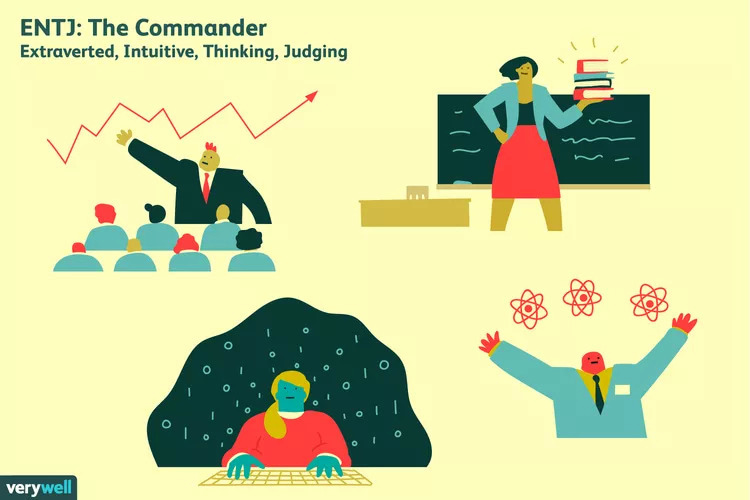
In professional settings, ENTJs are well-suited for leadership roles that require decisiveness, goal-setting, and efficient management. They possess a strong sense of vision and are skilled at motivating teams to achieve objectives. ENTJs are strategic thinkers who excel in navigating complex challenges, making them valuable assets in dynamic and competitive environments.
Despite their strengths, ENTJs may face challenges in situations that require a more diplomatic or empathetic approach. Their direct communication style and focus on results may sometimes be perceived as overly assertive or demanding. Balancing their assertiveness with consideration for the feelings and perspectives of others can contribute to more effective collaboration.
How ENTJs can be more productive:
- Goal setting: Setting clear goals and objectives is essential. Individuals with this personality type thrive on challenges, and having well-defined goals provides direction and motivation.
- Structured planning: Developing detailed plans is a key strength. ENTJs benefit from structured planning, ensuring that projects progress seamlessly toward successful outcomes. A systematic approach contributes to their efficiency and effectiveness in achieving objectives.
- Effective communication: Honing effective communication skills is crucial. Clear communication helps convey visions and expectations, fostering a collaborative work environment. Developing the ability to articulate ideas enhances their leadership capabilities.
- Adaptability: While excelling in planning, the ability to adapt to unexpected changes is crucial for sustained success. Cultivating adaptability allows ENTJs to navigate unforeseen challenges, ensuring flexibility in their strategic approaches.
Pain points of ENTJs:
- Impatience with inefficiency: Individuals with this personality type may become impatient with inefficiencies. Encouraging open communication to address concerns and collaboratively find efficient solutions helps maintain a positive and productive work environment.
- Overcommitting: Being cautious of overcommitting is crucial. The drive for achievement may lead to taking on too many tasks, potentially risking burnout. Prioritizing tasks and responsibilities helps ensure a sustainable workload.
- Balancing work-life: Striving for a balance between work and personal life is important. The dedication to careers may sometimes overshadow the importance of personal well-being. Recognizing the need for downtime and self-care contributes to overall happiness and productivity.
- Delegating empowerment: Ensuring empowerment when delegating tasks is key. Providing team members with the autonomy and resources needed to excel in their assigned roles fosters a sense of ownership and enhances overall team performance.
ENTP (The Debater) in the workplace
ENTPs or “The Debaters” are known for their energetic, innovative, and intellectually curious nature. These individuals thrive on exploring possibilities, generating creative ideas, and engaging in spirited debates to understand complex concepts. ENTPs are versatile thinkers who enjoy challenging the status quo and seeking unconventional solutions to problems.
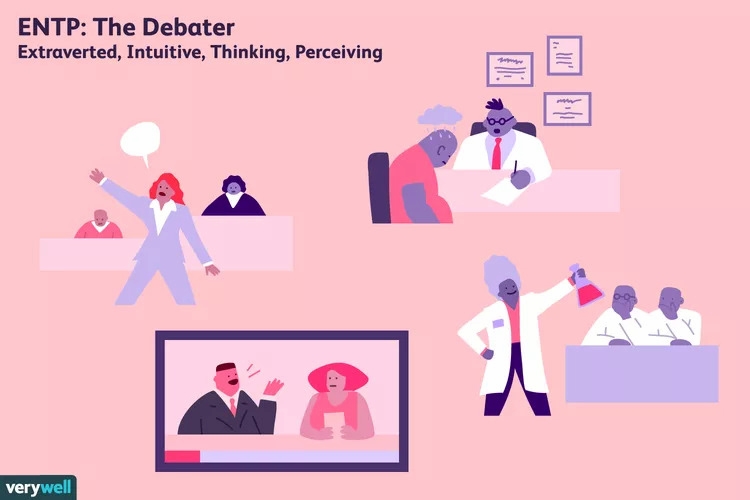
In professional settings, ENTPs excel in roles that require creative problem-solving, adaptability, and strategic thinking. They are adept at navigating uncertainty, spotting opportunities, and approaching challenges with a fresh perspective. ENTPs’ ability to connect seemingly unrelated ideas can lead to innovative breakthroughs, making them valuable contributors to projects that demand creativity and ingenuity.
However, ENTPs may encounter challenges when it comes to implementing their ideas or following through on projects. Their preference for exploring multiple possibilities can sometimes result in difficulty focusing on a single task or seeing a project through to completion. Cultivating discipline and organizational skills can help ENTPs leverage their creativity effectively while ensuring successful execution.
How ENTPs can be more productive:
- Variety in tasks: Introduce task variety. ENTPs thrive on diversity, so incorporating a mix of projects can keep them engaged and motivated.
- Brainstorming sessions: Facilitate brainstorming sessions. ENTPs excel in generating ideas; collaborative brainstorming sessions can harness their creative potential.
- Adapt to change: ENTPs are adaptable, so cultivating a flexible mindset allows them to navigate evolving work environments more effectively.
- Set milestones: Establish clear milestones. Breaking down larger tasks into manageable milestones gives ENTPs a sense of progress and accomplishment.
- Effective time management: Develop effective time management skills. ENTPs’ enthusiasm for new ideas may lead to time-consuming exploration; efficient time management ensures productivity.
Pain points of ENTPs:
- Overthinking possibilities: ENTPs may overthink possibilities. Focus on prioritizing ideas and bringing them to fruition rather than constantly exploring new concepts.
- Avoiding mundane tasks: Address a tendency to avoid mundane tasks. While ENTPs enjoy intellectual challenges, some routine tasks are unavoidable and require attention.
- Completion of projects: Ensure completion of projects. ENTPs’ enthusiasm for starting new projects may sometimes hinder the timely completion of existing ones.
- Balancing commitments: ENTPs’ eagerness to take on numerous projects may lead to scattered efforts. Developing a strategy to balance commitments ensures that each project receives the attention and dedication it deserves, promoting overall success.
INFJ (The Advocate) in the workplace
INFJs ( “The Advocates” or “Idealists”) are characterized by their compassion, insightfulness, and dedication to making a positive impact on the world. These people possess a deep sense of empathy, allowing them to understand others’ emotions and motivations. INFJs are natural counselors and often find fulfillment in helping others navigate challenges and achieve personal growth.

In workplaces, INFJs excel in roles that align with their values and allow them to contribute meaningfully to a cause. They are often drawn to careers in counseling, social work, or creative fields where they can leverage their creativity and insight. INFJs are known for their ability to envision long-term goals, and they approach their work with a sense of purpose and dedication.
While INFJs bring valuable qualities to the workplace, they may face challenges related to perfectionism and a tendency to overextend themselves to meet others’ needs. Their strong desire for harmony can sometimes lead them to avoid conflict, making it essential for INFJs to balance their altruistic nature with setting healthy boundaries. Additionally, managing stress and ensuring self-care is crucial for INFJs to maintain their well-being.
In summary, INFJs contribute a unique blend of empathy, vision, and dedication to the workplace. Their ability to understand and connect with others, coupled with a commitment to meaningful work, makes them valuable assets in roles that involve counseling, creativity, and positively impacting individuals or communities.
How INFJs can be more productive:
- Structured planning: Embrace structured planning. INFJs benefit from organizing tasks in advance, creating a roadmap to guide them toward their goals.
- Time blocking: Implement time-blocking techniques. Allocating specific time slots to different tasks enhances focus and helps INFJs manage their time efficiently.
- Mindful breaks: Incorporate mindful breaks. INFJs recharge through introspection, and short breaks provide opportunities for reflection, fostering sustained productivity.
- Collaborative decision-making: Encourage collaborative decision-making. INFJs appreciate consensus-building and value input from team members in the decision-making process.
Pain points of INFJs:
- Perfectionism: INFJs may struggle with perfectionism, which can hinder progress. Embrace the concept of “good enough” and focus on the overall impact of your contributions.
- Overcommitting: The desire to help may lead to over-committing. Help INFJs prioritize tasks and manage their workload effectively.
- Difficulty with criticism: Criticism can be challenging for INFJs. Provide constructive feedback and highlight their strengths to support their growth.
- Balancing personal and professional: Striking a balance between personal and professional life may be challenging. Offer flexibility and promote a healthy work-life balance.
INFP (The Mediator) in the workplace
INFPs, often known as “The Mediators” or “Healers,” are people with a deep sense of empathy, creativity, and commitment to authenticity. These individuals value harmony and seek to align their work with their values, often gravitating toward careers that allow them to express their creativity and make a positive impact on the world.

In the professional realm, INFPs thrive in roles that provide room for creative expression, individuality, and a sense of purpose. They are drawn to fields such as writing, counseling, the arts, or social work, where they can leverage their intuitive and compassionate nature. INFPs are often motivated by a desire to contribute to positive change and connect with others on a meaningful level.
While INFPs bring strengths of creativity and empathy to the workplace, they may encounter challenges related to indecision and a tendency to prioritize others’ needs over their own. Their idealistic nature can sometimes clash with the realities of the work environment, requiring INFPs to find a balance between their values and practical considerations. Additionally, setting boundaries and managing stress are crucial for INFPs to navigate the demands of the professional world.
In general, INFPs contribute a unique blend of creativity, empathy, and authenticity to the workplace. Their commitment to making a difference aligns well with roles that involve artistic expression, helping others, and contributing to positive social change.
How INFPs can be more productive:
- Personalized workspaces: Cultivate personalized workspaces. INFPs thrive in environments that reflect their individuality, enhancing creativity and motivation.
- Goal alignment: Align goals with personal values. Connecting tasks to their core values provides INFPs with a sense of purpose, driving motivation.
- Flexible schedules: Implement flexible schedules. INFPs appreciate the freedom to adapt their work hours to align with their creative flow, boosting productivity.
- Collaborative environments: Foster collaborative environments. Teamwork and open discussions stimulate their creativity and help generate innovative ideas.
Pain points of INFPs:
- Perfectionism: INFPs may struggle with perfectionism. Encourage them to embrace the iterative process and recognize the value of completed tasks.
- Difficulty with criticism: Criticism may be challenging for INFPs. Provide constructive feedback and emphasize the positive aspects to help them grow.
- Overemphasis on idealism: An overemphasis on idealism can lead to frustration. Balancing ideals with practical considerations supports their professional development.
- Difficulty in delegating: INFPs might find it challenging to delegate tasks. Encourage them to explore collaboration opportunities and share responsibilities within the team.
ENFJ (The Giver) in the workplace
ENFJs, often referred to as “The Protagonists” or “Givers,” embody a charismatic and empathetic personality. Driven by a deep sense of purpose, they thrive in environments that allow them to lead, inspire, and foster meaningful connections. ENFJs are drawn to careers where they can make a positive impact on individuals and communities.

In professional settings, ENFJs excel in roles that involve leadership, mentorship, and collaboration. They often find fulfillment in teaching, counseling, social work, or roles that require strong interpersonal skills. Their ability to understand and empathize with others makes them effective communicators and motivators within a team.
Despite their strengths, ENFJs may face challenges related to their high expectations, occasionally experiencing stress when others do not share their vision. Balancing their desire for harmony with the realities of the workplace can be a continual journey for ENFJs. Additionally, maintaining personal boundaries and managing stress are vital aspects of their professional well-being.
Essentially, ENFJs bring a blend of charisma, empathy, and leadership to the workplace. Their passion for creating positive change and fostering connections makes them valuable assets in team-oriented and people-focused roles.
How ENFJs can be more productive:
- Clear communication channels: Establish clear communication channels. ENFJs thrive when communication is open and transparent, ensuring that everyone’s voice is heard.
- Structured planning: Embrace structured planning. ENFJs benefit from organized workflows, so implementing project management tools can enhance efficiency.
- Recognition and appreciation: Provide recognition and appreciation. Acknowledging their efforts and contributions motivates ENFJs, fostering a sense of purpose.
- Team-building activities: Incorporate team-building activities. ENFJs excel in environments that encourage collaboration, making team-building exercises an effective way to strengthen relationships.
Pain points of ENFJs:
- Overcommitment: ENFJs may overcommit due to their desire to support others. Encourage realistic workload assessments and time management strategies.
- Difficulty saying no: A challenge in saying no might arise. Empower ENFJs to set boundaries and prioritize tasks to avoid overwhelming workloads.
- Emotional exhaustion: Emotional exhaustion may occur from their empathetic nature. Implementing stress-management techniques and providing emotional support contributes to their well-being.
- High expectations for themselves: ENFJs often have high expectations for themselves. Promote a healthy work-life balance and emphasize the value of self-care to prevent burnout.
ENFP (The Champion) in the workplace
ENFPs, known as “The Campaigners” or “Champions,” radiate enthusiasm, creativity, and a deep curiosity about the world. Their dynamic and flexible nature allows them to adapt to various roles, making them versatile contributors to diverse work environments.
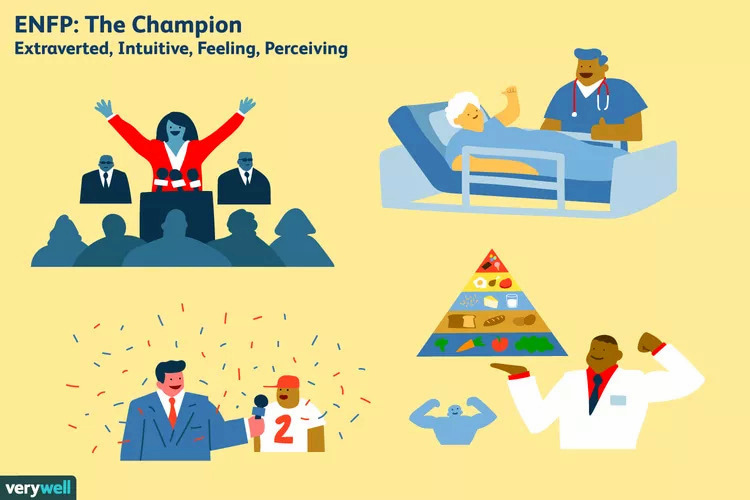
In professional settings, ENFPs thrive in creative industries, marketing, and roles that require innovative thinking. They excel in collaborative projects where their energy and ability to generate ideas can shine. Their natural charisma and ability to inspire others make them effective leaders in team-oriented environments.
While ENFPs bring creativity and a positive outlook to their work, they may encounter challenges related to prioritization and follow-through. Their excitement for new ideas can sometimes lead to a scattering of efforts, making it essential for them to develop strategies for staying organized and focused.
Overall, ENFPs contribute a blend of creativity, adaptability, and interpersonal skills to the workplace. Their passion for exploring possibilities and connecting with others makes them valuable assets in roles that demand innovation and collaboration.
How ENFPs can be more productive:
- Goal setting with milestones: Develop a structured approach to goal setting. Breaking down larger tasks into smaller, manageable steps helps ENFPs maintain focus and achieve objectives.
- Time management techniques: Embrace time management techniques, such as the Pomodoro Technique or task batching, to maintain productivity while allowing space for creativity.
- Variety and flexibility: Embrace variety and flexibility. ENFPs excel in dynamic environments, so incorporating diverse tasks and allowing for flexibility sparks their creativity.
- Collaborative platforms: Utilize collaborative platforms. ENFPs thrive on interaction and collaboration, making digital platforms an effective means for brainstorming and sharing ideas.
- Regular check-ins: Implement regular check-ins. Providing ENFPs with the opportunity to express ideas and discuss progress fosters a supportive and communicative work environment.
Pain points of ENFPs:
- Distraction: Campaigners may be prone to distraction due to their love for exploration. Implementing focused work periods and minimizing potential distractions enhances productivity.
- Decision paralysis: ENFPs may need help in decision-making. Developing strategies to streamline choices and trusting intuition supports more decisive actions.
- Difficulty with repetition: ENFPs may struggle with repetitive tasks. Offer opportunities for skill development and task rotation to keep them engaged.
- Tendency to overcommit: A tendency to overcommit to projects might arise. Encourage realistic goal-setting and prioritize tasks to prevent burnout.
- Sensitivity to criticism: ENFPs can be sensitive to criticism. Provide constructive feedback and focus on their strengths to create a positive and motivating feedback loop.
ISTJ (The Inspector) in the workplace
ISTJs, often referred to as “The Inspectors” or “Logisticians,” embody a meticulous and responsible approach to work. Their commitment to structure and order makes them reliable team members, particularly in roles that demand attention to detail and precision.
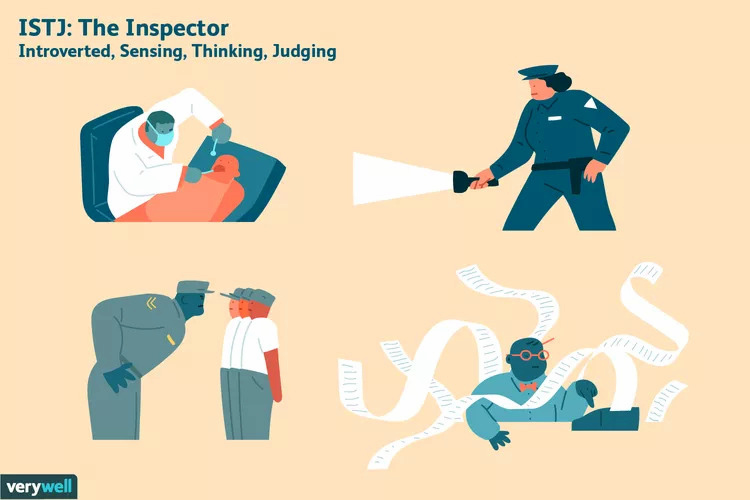
ISTJs excel in positions that require methodical planning, project management, and adherence to established procedures. Their strong sense of duty and loyalty makes them dependable colleagues, contributing to a stable and consistent work environment. ISTJs are often found in fields such as finance, administration, and quality assurance.
While their commitment to rules and procedures is an asset, ISTJs may face challenges related to flexibility and adaptability. Their preference for structure can sometimes lead to resistance when confronted with unexpected changes. Developing strategies to embrace change and fostering open communication can enhance their professional growth.
In summary, ISTJs bring reliability, organizational skills, and a strong work ethic to the workplace. They’re able to create order and adhere to established systems which makes them valuable contributors in roles that require stability and precision.
How ISTJs can be more productive:
- Task prioritization: Prioritize tasks effectively. ISTJs excel when tasks are organized based on importance, allowing them to focus on critical responsibilities first.
- Clear expectations: Set clear expectations. ISTJs appreciate clarity in instructions and expectations, contributing to a more efficient work process.
- Detailed documentation: Embrace detailed documentation. Providing ISTJs with clear guidelines and documented procedures enhances their confidence and performance.
- Structured work environment: Create a structured work environment. ISTJs thrive in organized spaces, so maintaining an orderly workspace contributes to their productivity.
Pain points of ISTJs:
- Perfectionism: ISTJs may grapple with perfectionism, leading to potential delays. Embracing a mindset that acknowledges the importance of progress over perfection can alleviate this pressure.
- Difficulty delegating tasks: Inspectors might find it challenging to delegate tasks. Learning to trust others with responsibilities contributes to more efficient teamwork.
- Resistance to change: ISTJs may resist abrupt changes. When implementing changes, communicate the rationale clearly, involving them in the process to ease their adjustment.
- Limited flexibility: ISTJs may struggle with unexpected changes. Offering flexibility within reasonable bounds helps them adapt to shifting circumstances while maintaining stability.
ISFJ (The Protector) in the workplace
ISFJs apply a nurturing and empathetic approach to their professional endeavors. Their commitment to supporting others and maintaining harmony makes them valuable team members, contributing to a positive and collaborative work environment.
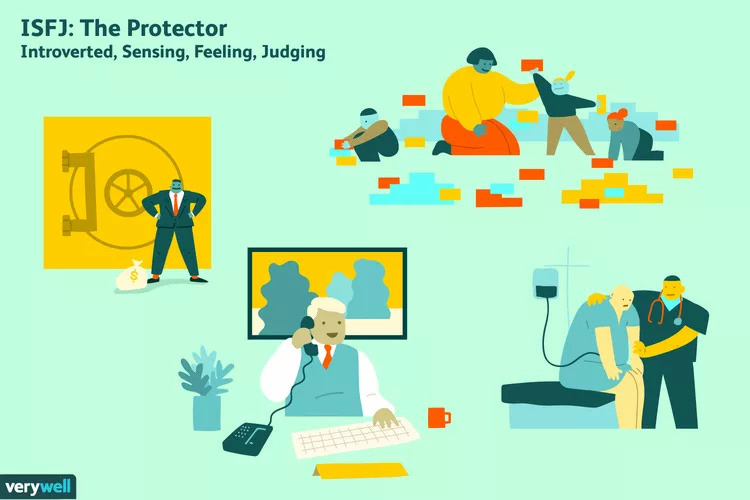
In professional settings, ISFJs excel in roles that involve interpersonal relationships, such as human resources, customer service, and healthcare. Their empathetic nature enables them to understand and address the needs of those around them, fostering strong connections with colleagues and clients.
While their caring and supportive nature is an asset, ISFJs may encounter problems related to assertiveness. Their preference for avoiding conflict and prioritizing others’ needs can sometimes hinder their ability to assert themselves in professional situations. Developing assertiveness skills and recognizing the importance of self-advocacy can contribute to their professional growth.
In summary, ISFJs bring compassion, strong interpersonal skills, and a commitment to harmony to the workplace. Their ability to create a supportive and positive atmosphere makes them valuable contributors in roles that involve teamwork and relationship-building.
How ISFJs can be more productive:
- Setting boundaries: Establish clear boundaries to prevent overcommitment. ISFJs’ willingness to help others may be more effective when balanced with self-care.
- Time blocking: Implement time-blocking techniques to allocate specific periods for different tasks. This structured approach helps ISFJs manage their time effectively.
- Detailed planning: Embrace detailed planning. ISFJs thrive when tasks are well-organized, making it essential to provide clear instructions and timelines for their responsibilities.
- Open communication channels: Foster open communication channels. Encourage ISFJs to express their ideas and concerns, ensuring they feel valued and heard within the team.
- Recognition of contributions: Recognize their contributions personally. ISFJs appreciate acknowledgment for their efforts, and a personal touch in recognition enhances their motivation.
- Structured feedback: Constructively offer feedback, highlighting their strengths and suggesting improvements to help them grow professionally.
Pain points of ISFJs:
- Overcommitting: ISFJs may overcommit due to their desire to help others. Guide them in setting realistic boundaries and prioritizing their well-being.
- Difficulty handling criticism: Handling criticism can be challenging. Approach feedback with sensitivity and emphasize constructive aspects to help them process and grow from it.
- Avoiding conflict: ISFJs may avoid conflict. Encourage them to navigate conflicts constructively and provide a supportive environment for expressing concerns.
- Reluctance in delegating: Reluctance in delegating tasks can occur. Support ISFJs in developing delegation skills and building trust in the capabilities of their colleagues.
ESTJ (The Director) in the workplace
ESTJs, commonly referred to as “The Executives/Directors”, embody a results-driven and systematic approach in their professional pursuits. Recognized for their unwavering commitment to structure and responsibility, ESTJs thrive in environments where order and efficiency reign supreme.
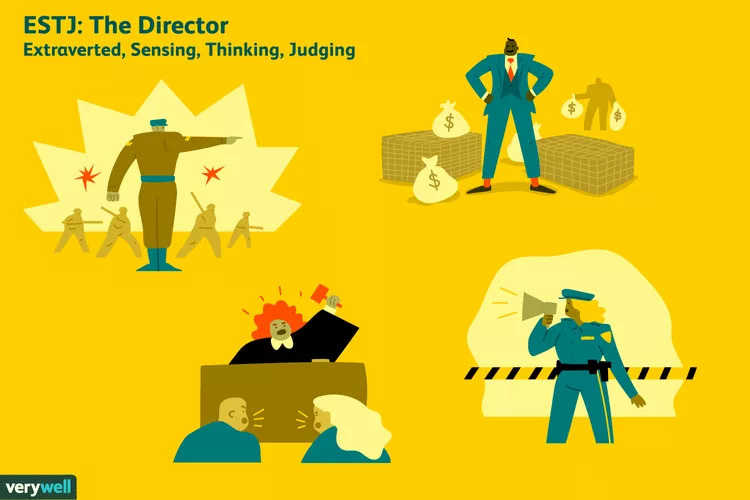
In professional settings, ESTJs shine in roles that prioritize precision and well-defined processes. Leveraging their organizational prowess and effective leadership skills, they often ascend to managerial or supervisory positions. ESTJs excel at establishing clear objectives, implementing structured workflows, and ensuring task alignment with overarching organizational goals.
While their methodical approach enhances operational efficiency, ESTJs may face adaptability challenges. A preference for established procedures might breed resistance to sudden changes or unexpected challenges. Nurturing flexibility and adopting a more adaptable mindset can empower ESTJs to navigate dynamic work environments with increased ease.
In essence, ESTJs contribute reliability, leadership acumen, and organizational efficiency to the workplace. Their dedication to structured processes renders them invaluable in roles requiring strategic planning, execution, and a focus on achieving tangible results.
How ESTJs can be more productive:
- Goal-oriented planning: Establish clear, measurable goals. ESTJs are goal-oriented and excel when they have a well-defined path to follow, allowing them to channel their energy into achieving objectives.
- Efficient time management: Implement efficient time management strategies. Provide tools and resources to help ESTJs prioritize tasks, ensuring they can allocate time effectively across various responsibilities.
- Structured workflows: Promote structured workflows. ESTJs work well when tasks are organized systematically, enabling them to navigate their responsibilities with efficiency and precision.
- Leadership opportunities: Offer leadership opportunities. ESTJs thrive in roles where they can take charge and guide others, leveraging their natural leadership abilities to drive projects forward.
- Recognition for contributions: Recognize their contributions publicly. Acknowledging their efforts and achievements motivates ESTJs to continue delivering high-quality work.
Pain points of ESTJs:
- Resistance to change: ESTJs may resist sudden changes in processes. Provide clear communication about changes and involve them in the transition process to ease their adaptation.
- Impatience with inefficiency: ESTJs can be impatient with inefficiencies. Encourage them to communicate concerns constructively and involve them in process improvement discussions.
- Struggle delegating: Difficulty delegating tasks can be a challenge. Support ESTJs in developing delegation skills and trust in the capabilities of their team members.
- Overlooking others’ perspectives: Due to their focus on efficiency, ESTJs may overlook diverse perspectives. Promote inclusivity and encourage them to consider various viewpoints to enhance team collaboration.
ESFJ (The Caregiver) in the workplace
ESFJs embody a compassionate and people-centric approach to their professional engagements. Renowned for their interpersonal skills and nurturing demeanor, ESFJs thrive in environments where collaboration and support are fundamental.

Within the workplace, ESFJs excel in roles that demand strong interpersonal connections and effective communication. Their ability to foster teamwork and maintain harmonious relationships often positions them in roles such as human resources, customer service, or team leadership. ESFJs are adept at navigating complex social dynamics and ensuring that the well-being of individuals within the team is prioritized.
While their people-focused approach enhances team cohesion, ESFJs might encounter challenges related to delegation and assertiveness. A strong desire to please others could lead to a tendency to take on too much, potentially impacting their workload. Cultivating assertiveness and honing delegation skills can empower ESFJs to strike a balance between serving others and managing their professional responsibilities.
In summary, ESFJs bring warmth, empathy, and strong interpersonal skills to the workplace. Their dedication to fostering positive work environments makes them valuable contributors in roles that require effective communication, teamwork, and a focus on the well-being of the team.
How ESFJs can be more productive:
- Collaborative spaces: Foster collaborative workspaces that allow ESFJs to interact with colleagues. They thrive in environments where they can build connections and contribute to a positive team atmosphere.
- Clear communication: Prioritize clear and open communication. ESFJs appreciate transparency and understanding the broader context of their tasks, helping them feel more engaged and motivated.
- Structured planning: Implement structured planning processes. ESFJs benefit from well-organized plans and schedules, providing them with a clear roadmap for their tasks and responsibilities.
- Team recognition: Acknowledge individual and team achievements. Recognizing their contributions boosts ESFJs’ morale and motivates them to actively participate in group efforts.
- Regular check-ins: Conduct regular check-ins and feedback sessions. ESFJs appreciate guidance and reassurance, and consistent communication helps them feel supported in their roles.
Pain points of ESFJs:
- Overextending themselves: ESFJs may overcommit due to their desire to help others. Encourage realistic workload expectations and promote a healthy work-life balance.
- Conflict aversion: A strong aversion to conflict may hinder ESFJs in challenging situations. Providing conflict resolution training and fostering an open dialogue helps them navigate conflicts more effectively.
- Difficulty saying no: ESFJs may find it challenging to decline requests. Encouraging assertiveness training and setting boundaries helps them manage their workload more effectively.
- Resistance to change: ESFJs may resist sudden changes. Gradual transitions and clear communication about changes can help them adapt more comfortably to new situations.
ISTP (The Crafter) in the workplace
ISTPs use a hands-on and pragmatic approach to their professional pursuits. Their adaptability and keen problem-solving skills make it possible for them to thrive in environments that allow them to explore and engage with the tangible world.
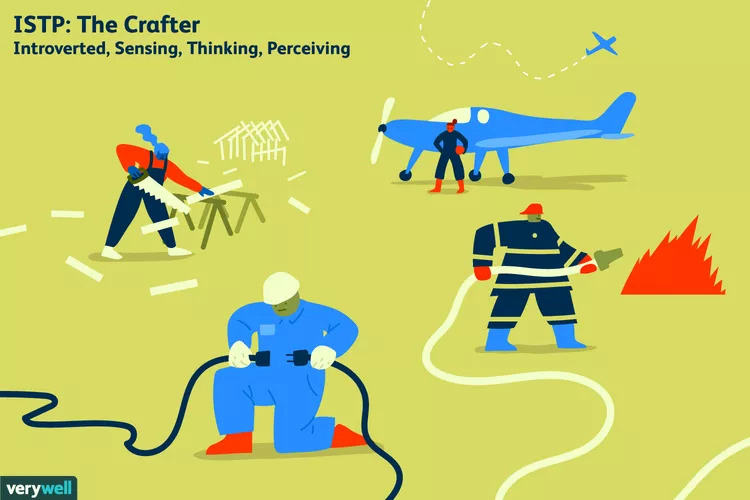
Within the workplace, ISTPs excel in roles that demand technical expertise, independence, and a knack for troubleshooting. Their ability to remain calm under pressure and find practical solutions positions them well in fields such as engineering, technology, or skilled trades. ISTPs are adept at navigating complex systems and leveraging their analytical mindset to address challenges effectively.
While their hands-on approach enhances their problem-solving capabilities, ISTPs might encounter challenges related to long-term planning and routine tasks. A preference for spontaneity can make them less inclined towards structured schedules or repetitive processes. Balancing their dynamic problem-solving with attention to routine tasks can empower ISTPs to thrive in diverse work environments.
In summary, ISTPs bring a practical, adaptable, and analytical mindset to the workplace. Their ability to navigate technical challenges and think on their feet makes them valuable contributors in roles that require hands-on problem-solving, technical expertise, and a focus on pragmatic solutions.
How ISTPs can be more productive:
- Hands-on learning: Engage ISTPs through hands-on learning experiences and practical challenges. They excel when they can apply their analytical skills tangibly and pragmatically.
- Problem-solving autonomy: Provide opportunities for independent problem-solving. ISTPs thrive when granted the autonomy to tackle challenges in their way, fostering a sense of ownership and productivity.
- Flexible environments: Create flexible work environments that allow for movement and change. ISTPs often benefit from environments where they can easily shift focus and adapt their surroundings to suit the task at hand.
- Realistic goals: Set clear, realistic goals and objectives. ISTPs appreciate a straightforward approach to tasks, and well-defined goals help them channel their energy effectively.
- Continuous learning: Support ongoing learning opportunities. ISTPs enjoy mastering new skills, so providing access to training and educational resources keeps them engaged and enhances their productivity.
Pain points of ISTPs:
- Routine repetition: Repetitive routines can lead to boredom. Offering tasks with variety and challenges keeps ISTPs stimulated and prevents a decline in motivation.
- Overly controlling environments: Environments that restrict autonomy may frustrate ISTPs. Fostering a culture of trust and providing freedom within boundaries encourages their optimal performance.
- Ambiguity in tasks: Unclear or ambiguous tasks may hinder productivity. Clearly define expectations and provide context to help ISTPs understand their role in projects effectively.
- Group dependency: ISTPs may struggle in overly group-dependent situations. Balancing collaborative efforts with independent tasks allows them to contribute effectively to team projects.
ISFP (The Artist) in the workplace
ISFPs bring a creative and adaptable spirit to their professional endeavors. Valuing aesthetics and self-expression, ISFPs thrive in environments that allow them to infuse their artistic sensibilities into their work.

Within the workplace, ISFPs excel when provided with opportunities for visual organization and creative expression. Utilizing tools like mood boards or mind maps enhances their ability to structure ideas in a visually engaging manner. ISFPs can contribute effectively to collaborative projects that allow them to showcase their artistic talents.
While their creativity is a strength, ISFPs may encounter challenges related to conflict-avoidance and decision-making. Their desire to maintain harmony may lead them to avoid conflicts, hindering open communication. Encouraging constructive expression of opinions and providing guidance in decision-making can support the professional growth of ISFPs.
In summary, ISFPs bring a unique blend of creativity, adaptability, and artistic flair to the workplace. Their ability to visualize ideas and contribute to a harmonious work environment makes them valuable collaborators in roles that emphasize creativity, visual expression, and a dynamic approach to tasks.
How ISFPs can be more productive:
- Visual organization: Utilize visual tools for organization, such as mood boards or mind maps. ISFPs benefit from visually engaging methods to structure ideas and tasks.
- Structured deadlines: Establish structured deadlines to avoid last-minute pressure. Providing clear timelines helps Artists manage their time effectively.
- Variety in tasks: Incorporate variety into their tasks to keep their creative energy flowing. Rotating projects or introducing diverse elements within a project prevents monotony and boosts productivity.
- Collaborative environment: Cultivate a collaborative work environment where ISFPs can share ideas and insights. Collaborative efforts tap into their social nature, enhancing both creativity and productivity.
- Flexible workspaces: Allow flexibility in workspaces to accommodate their need for a change in scenery. Creating a dynamic environment helps ISFPs stay inspired and engaged.
Pain points of ISFPs:
- Conflict avoidance: ISFPs may avoid conflict to maintain harmony. Encouraging open communication and expressing opinions constructively supports their professional growth.
- Decision-making: Artists might struggle with decision-making. Offering guidance and breaking down choices into smaller, manageable options aids ISFPs in making confident decisions.
- Structured routine: Overly structured routines may stifle creativity. Allow some flexibility in their daily routine, enabling them to embrace spontaneity and explore their creativity.
- Handling criticism: ISFPs may find it challenging to handle criticism. Offering constructive feedback and emphasizing growth-oriented discussions helps them navigate and learn from critiques.
ESTP (The Persuader) in the workplace
ESTPs, often known as “Entrepreneurs” or “Persuaders,” thrive on a bold and action-oriented approach in their professional pursuits. Recognized for adaptability and resilience, ESTPs excel in dynamic environments that require quick thinking and proactive problem-solving.
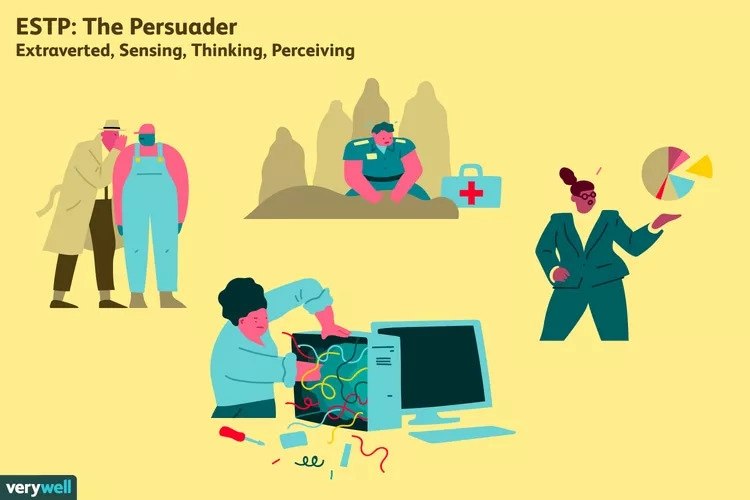
In the workplace, ESTPs shine in roles demanding rapid decision-making, strategic troubleshooting, and hands-on engagement. Their ability to navigate challenges with agility and respond effectively positions them well in fast-paced, competitive settings. ESTPs are drawn to careers involving negotiation, sales, or entrepreneurial ventures.
Despite their spontaneity, ESTPs may face challenges related to long-term planning and a preference for immediate results. Cultivating strategic foresight and considering long-term implications can enhance their effectiveness in roles requiring a more structured and future-oriented perspective.
In general, ESTPs bring dynamic, results-driven energy to the workplace. Their pragmatic approach and ability to navigate challenges make them well-suited for roles that demand quick thinking, adaptability, and a focus on immediate outcomes.
How ESTPs can be more productive:
- Goal alignment: Clearly align tasks with overarching goals to provide ESTPs with a sense of purpose. Connecting daily activities to larger objectives keeps Entrepreneurs focused and motivated.
- Time management: Utilize time management tools to organize tasks and deadlines. ESTPs benefit from structured schedules that allow them to make the most of their high-energy periods.
- Project delegation: Entrepreneurs can improve productivity by mastering the art of delegation. Assigning tasks to team members based on their strengths enables ESTPs to focus on strategic aspects of projects.
- Feedback loop: Establish a feedback loop for continuous improvement. Regular feedback sessions help Entrepreneurs identify areas of growth and refine their approach to tasks.
Pain points of ESTPs:
- Impulsivity: Entrepreneurs may act impulsively. Encouraging them to consider potential consequences and weigh options before deciding enhances their decision-making.
- Long-term planning: ESTPs might struggle with long-term planning. Breaking down extended goals into smaller milestones helps Entrepreneurs approach projects more systematically.
- Delegating effectively: Entrusting others with tasks can be a challenge. ESTPs benefit from learning how to delegate effectively, ensuring tasks align with team members’ capabilities.
- Balancing multiple tasks: Juggling multiple tasks simultaneously may lead to burnout. Entrepreneurs should focus on prioritization and time allocation to maintain productivity.
ESFP (The Performer) in the workplace
ESFP is one of the personality types that infuse the workplace with vibrant energy and a zest for life. Recognized for their sociable and spontaneous nature, ESFPs thrive in dynamic environments that allow them to express creativity and connect with others.
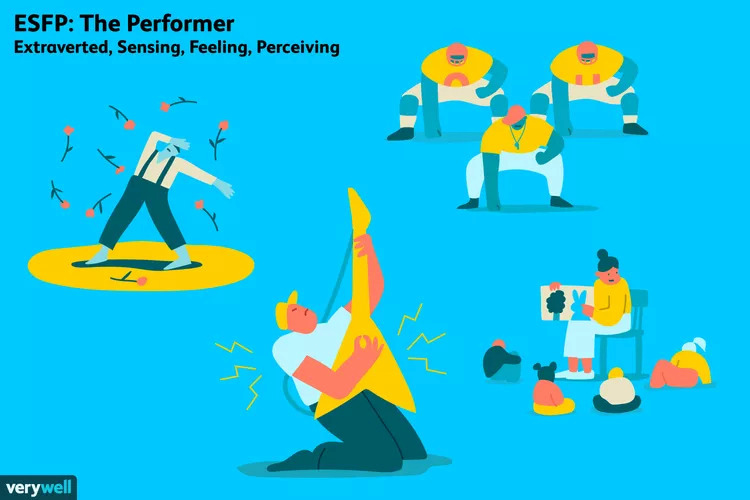
ESFPs thrive in roles that leverage their strong interpersonal skills, such as sales, marketing, or customer service. Their natural ability to connect with others often places them in positions that require teamwork and direct interaction with people. They also play a key role in fostering a positive workplace culture by building strong relationships and promoting collaboration.
However, ESFPs may face challenges with long-term planning and staying focused on details. Strengthening their organizational skills and balancing spontaneity with structure can help them excel in roles that require strategic thinking and attention to detail.
In summary, ESFPs bring energy and a personal touch to their work. Their talent for creating engaging and collaborative environments makes them valuable in positions focused on teamwork, customer engagement, and meaningful connections.
How ESFPs can be more productive:
- Visual aids: Incorporate visual aids to enhance learning and task comprehension. ESFPs benefit from interactive and visually stimulating materials to stay engaged.
- Flexible environment: Create a flexible work environment that allows for movement and social interaction. Entertainers thrive in settings that accommodate their need for variety and interaction.
- Structured breaks: Implementing structured breaks during the workday helps ESFPs maintain focus and energy levels. Short breaks contribute to overall productivity.
- Goal setting: Establish clear, achievable goals to guide their efforts. ESFPs can enhance productivity by breaking down larger tasks into smaller, more manageable steps.
Pain points of ESFPs:
- Task monotony: Like a lot of other personality types, ESFPs may struggle with repetitive tasks. Introducing variety into their responsibilities keeps Performers motivated and engaged.
- Attention to detail: Paying attention to detail may be a challenge for ESFPs. Encouraging them to develop strategies, such as checklists, helps them manage intricate aspects of their work.
- Long-term planning: Focusing on long-term goals may be challenging. ESFPs benefit from setting milestones and creating a roadmap to maintain a sense of direction.
- Balancing social and work life: ESFPs may prioritize socializing over work. Promoting a healthy work-life balance helps them manage their social and professional commitments effectively.
16 MBTI Personality Types In the Workplace: TL;DR
| Personality types | Pros | Cons |
| INTJ | Strategic thinkers, visionary leaders | May seem aloof or arrogant |
| INTP | Innovative, problem solvers | Tendency to overanalyze |
| ENTJ | Strong leadership, Goal-oriented | Can be too assertive or intimidating |
| ENTP | Creative problem-solvers, adaptable | May struggle with follow-through |
| INFJ | Insightful, compassionate | Perfectionistic tendencies |
| INFP | Idealistic, dedicated | Difficulty with practical tasks |
| ENFJ | Charismatic leaders, empathetic | May take criticism personally |
| ENFP | Energetic, inspiring | Easily bored, can struggle with routine |
| ISTJ | Reliable, organized | May resist change or new ideas |
| ISFJ | Supportive, conscientious | May struggle with delegation |
| ESTJ | Efficient, decisive | Can be perceived as too authoritative |
| ESFJ | Socially skilled, reliable | May prioritize others’ needs over their own |
| ISTP | Practical, analytical | May avoid expressing emotions |
| ISFP | Artistic, adaptable | Tendency to avoid conflict |
| ESTP | Energetic, action-oriented | Impulsive decision-making |
| ESFP | Enthusiastic, sociable | May struggle with long-term planning |
Personality Types: Conclusion
In conclusion, understanding MBTI personality types highlights the unique traits that individuals bring to the workplace. Recognizing these differences can improve teamwork, but it’s important to avoid rigid labels. Every personality type offers strengths and challenges, and fostering an inclusive environment helps value these differences. By appreciating diverse perspectives, workplaces can encourage innovation, collaboration, and success. Summing up, embracing a variety of personality types creates a dynamic and productive environment where everyone’s strengths contribute meaningfully.
In case you are managing a team of 5 or more and looking to boost efficiency, Everhour is the perfect tool to keep your team on track. With seamless time tracking, you can easily estimate task durations, set clear budgets, and generate detailed reports inside Asana, Trello, Jira, or any other pm tool.

